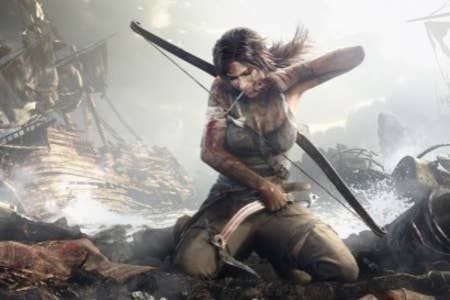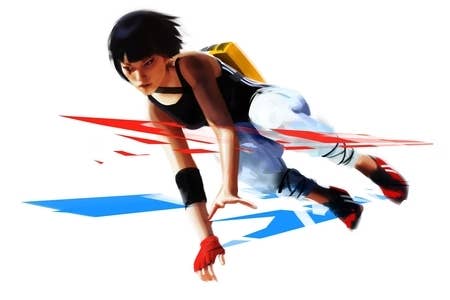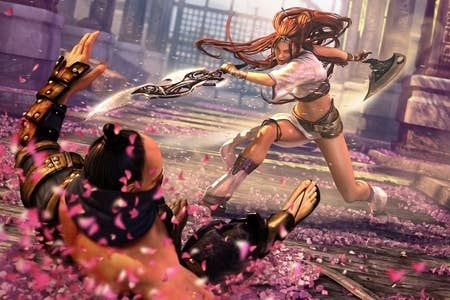Rhianna Pratchett: Rewriting Lara Croft
Tomb Raider's narrative designer is taking Lara back to the genesis of action game heroines
Like all the best biographers, narrative designer Rhianna Pratchett is the first to admit that she has had a rocky relationship with her subject.
"I'd grown up with Lara, but I'd also had a bit of a love/hate relationship with her over the years," she says of Lara Croft, the instantly recognisable star of the Tomb Raider reboot that Pratchett has been working on for two and a half years.
"I'd even written things in the press being slightly grumpy about the way Lara had become. Big boobs and etcetera etcetera. So this was a chance to kind of put up or shut up I guess, and having experience with writing Nariko and Faith as well it was really like going back to the genesis of action game heroines."

That's Faith from Mirror's Edge and Nariko from Heavenly Sword, just in case you'd forgotten to check your pack of gaming heroine Top Trumps. Pratchett, who started out as a journalist for the magazine PC Zone, is also the words behind the Overlord series and Viking: Battle For Asgard.
Pratchett says key to her work on Tomb Raider was making Lara more relatable, and trying to find a way back from the "aristocratic ice queen" that the series and films transformed her into. The focus of the team, she adds, was to "get away from Teflon coated Lara."
"I'd written things in the press being slightly grumpy about the way Lara had become. Big boobs and etcetera etcetera"
Key to Pratchett's method is looking at the actual mechanics of the game play, and building character from there.
"With someone like Faith [from Mirrors Edge] it's asking questions like 'in the gameplay mechanic there's lots of running away, why would someone live a life where there's a lot of that, and what are they running away from? Do they want to stop running, what would they do if they did stop running, what would it take to stop them?'"
"So actually looking at how those gameplay mechanics feedback into character, because I think that helps to embed the character in the world more, rather than making them seem slightly outside the game playing world. And that was something we definitely wanted to do with Lara."
And this Lara does seem more vulnerable, more human than any before, with the resourcefulness she shows in the game play, solving puzzles, hunting, reflected in her back story. Of course as with any good game release, the reboot has not been without its controversies.
"I think due to some of the coverage that's come out about Tomb Raider my gender has been touched upon probably more heavily than I hoped it would," she says, politely ignoring the fact it was being touched on again.

"Because I've been doing this a long time, I've worked on female characters, everyone kind of knows what I do and what I've done in the past and I really wanted to talk more about bringing the humanity and warmth back to Lara as a character. I try not to especially focus on the fact that she's female or the fact that I'm female. But people tend to focus on your gender in this industry more than you do."
But, she says tolerantly, it gives her a platform to talk about more interesting things. Like games narrative, character creation, and to call for more diversity and for narrative designers to be involved earlier on in the development process.
It's something Pratchett is passionate about, and spoke about last month at the TEDx Transmedia event in Rome. While the visibility of writers in the industry has improved, there's still a way to go when it comes to making the process as productive as it can be for the writers and the developers they're working with.
"There's a bit of an unfortunate attitude in certain sections of the industry that writers are the people that do the word bits"
"There's definitely still work to be done. Writers are more visible now, they're out there, they're talking about what they do, what goes right, what goes wrong, how to tell the difference, how to evolve things."
"And that's really great to get this dialogue out there and start talking about it. And that's something I definitely strive to do, because I don't think you change anything by staying quiet. Although that's probably blacklisted me from a few companies," she laughs.
And, she points out, while studios are finally seeing the value in hiring professional writers, they're not always using them in the right way. She mentions being called in as a "narrative paramedic" to try and build a story around a game at the end of development.
"There's a big tick in the professional writer column, but now it's trying to fit somewhat square pegs into somewhat round holes, and it's that where it needs the improvements," she explains.
"There's a bit of an unfortunate attitude in certain sections of the industry that writers are the people that do the word bits, and therefore word bits are easy and quick and they can just be slotted in wherever and that has led to writers being brought in late because they think they can just sort of put some words in and it'll be fine. And that's kind of led to very difficult, very trying, very narrative paramedic-ing situations for writers."

Both sides are still evolving, writers are learning how to deal with the limitations of the medium, and the developers are learning that the value lies in more than just hiring them at the last minute to write a few jokes for NPC #182. There's hope.
"They are learning," she promises. "We are moving in the right direction."
Pratchett is currently working on the screenplay for an adaptation of Janet Paisley's historical novel, Warrior Daughter, on a second, unannounced big franchise for Square Enix and replaying the Bioshock games.

